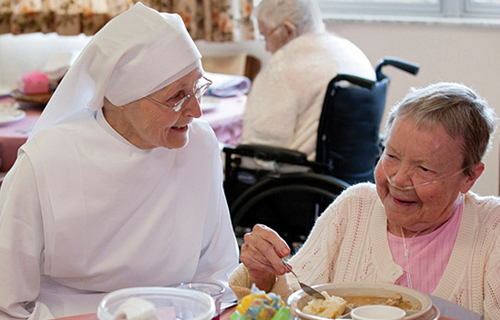Civil Strategies to Defend Religious Freedom for All People of Faith
COMMENTARY: Now is not the time to panic. People of faith need strategies to weather this storm.

“In his first two weeks in office, President Biden has signed nearly as many executive orders as Franklin Roosevelt signed in his entire first month,” reported National Public Radio recently. In addition to this flurry of executive orders, the president has pulled other levers of executive authority by signing presidential memoranda, proclamations and letters. Some of these early actions are squarely at odds with the religious beliefs of many Americans.
Now is not the time to panic. People of faith need strategies to weather this storm.
Ryan Anderson, newly appointed president of the Ethics and Public Policy Center in Washington, D.C., recently wrote an opinion piece in The Wall Street Journal observing that “basic truths about human nature” are not solely the concern of the religious.
“We need to oppose the left’s agenda on the merits. It’s the principled thing to do, and it will be good politics given where the American people actually are on the issues,” urged Anderson.
Changing the hearts and minds of the powerful will take time, but people do not have to be like-minded to appreciate the protections offered by deeply rooted principles of U.S. government. Americans of faith find a substantial measure of protection from a venerable institution that happens to be neither religious nor political. I’m talking about the Supreme Court.
The Supreme Court is currently not dominated by “activist judges.” But, thank goodness, it is sympathetic to the defense of religious freedom and conscience rights. Just look at some recent decisions.
The high court just taught California a lesson: Worship-targeting is unconstitutional. Two churches in California — South Bay United Pentecostal and Harvest Rock Church — went to court to stop rules banning indoor worship and singing in church in certain areas of the state.
The Supreme Court handed the churches a partial victory by halting the ban on indoor worship. In a concurring opinion, Chief Justice John Roberts wrote that “the state’s present determination — that the maximum number of adherents who can safely worship in the most cavernous cathedral is zero — appears to reflect not expertise or discretion, but instead insufficient appreciation or consideration of the interests at stake.” Please note: Only an order by a court could reopen cathedrals in California.
California’s penchant for overreach is nothing new. In their careers as attorney general of the Golden State, both Vice President Kamala Harris and Secretary of Health and Human Services nominee Xavier Becerra tried to force pro-life pregnancy centers to promote the state’s free or low-cost abortion services. The National Institute of Family Life Advocates, a group representing pro-life pregnancy centers across the country, fought back, arguing that the California law violated the First Amendment’s prohibition against compelled speech. And they won. Harris and Becerra were seeking “not to advance a legitimate regulatory goal, but to suppress unpopular ideas or information,” wrote Justice Clarence Thomas for the Supreme Court. Does anyone think that in the absence of the high court’s ruling Harris and Becerra would have let up?
It also mustn’t be forgotten that the Supreme Court has all but buried state Blaine Amendments — anti-Catholic laws from the late 1800s that barred government funds from benefitting “sectarian” activity in two recent cases. The first involved the exclusion of a church-run preschool from a Missouri grant program.
“In this case, there is no dispute that Trinity Lutheran is put to the choice between being a church and receiving a government benefit,” explained Chief Justice John Roberts. Such an exclusion, Roberts continued, “is odious to our Constitution all the same, and cannot stand.”
The second case, decided last summer, involved a state-sponsored private-school scholarship program in Montana that was not open to religious schools. Roberts again wrote for the majority: “The prohibition before us today burdens not only religious schools but also the families whose children attend or hope to attend them.” School-choice initiatives in Montana would have had to exclude Catholic and other religious schools had the Supreme Court not ruled.
Another example is quite familiar: After nearly a decade locked in a legal battle, the Little Sisters of the Poor have been freed from the Affordable Care Act’s contraceptive mandate. Their first Supreme Court victory forced the federal government to draft an acceptable accommodation.
This past summer the Supreme Court again sided with the sisters when progressive state attorneys general in Pennsylvania (Josh Shapiro) and California (Becerra) objected to the federal government accommodation. When Biden undoes the exemption — which he has pledged he will do — should the sisters give up? Certainly not.
Finally, this term the Supreme Court will decide if the city of Philadelphia can shut out the Archdiocese of Philadelphia from partnering in foster care. The archdiocese is unwilling to certify same-sex couples as foster parents. Instead, it offers to refer any same-sex married couples interested in fostering children to other agencies working with the city.
Two longtime foster mothers joined the archdiocese to object in court. Catholic-run foster-care and adoption programs in other parts of the country, when pressed to endorse same-sex marriages, have stopped operating. No sermon on the nature of traditional marriage could convince Philadelphia’s city officials to keep the doors of the Catholic agency open. But an order from the Supreme Court could achieve that.
Under the Biden administration, religious or moral objectors will be silenced or fined for insisting on their rights to worship and exercise their religion freely. This is certainly unsettling. The best strategies for people of faith in these challenging times are to confidently speak truthfully about their beliefs and keep up a vigorous defense of religious freedom in court.
- Keywords:
- religious freedom
- andrea picciotti-bayer
















